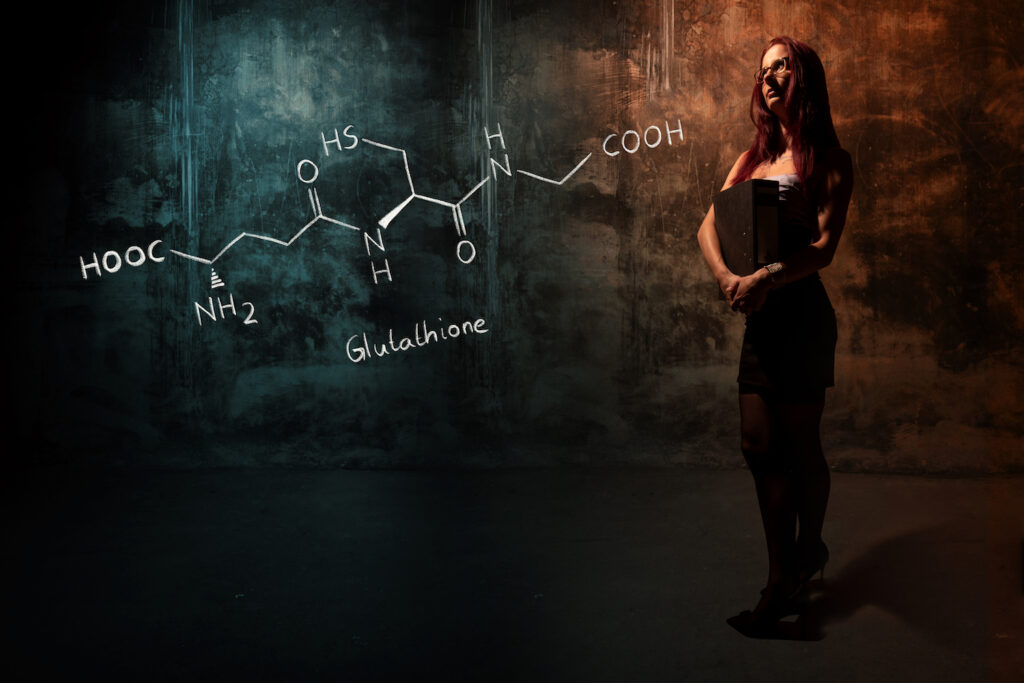
Toxins affect your body every moment of each day, and glutathione is the “master detoxifier” inside all of your cells that helps protect you. So, when glutathione levels get low due to aging or environmental stress, it can be a health problem.
You produce glutathione primarily in your liver, and your body can absorb glutathione and the raw materials to make it by eating fruits, vegetables, and meats. The glutathione molecule is composed of three amino acids: glutamate, glycine, and cysteine.
What does glutathione do?
We know that low glutathione levels are associated with oxidative stress and autoimmune conditions, as well as autism spectrum disorders. How can one molecule be involved in so many biochemical pathways?
Glutathione exists in the cells of plants, animals, fungi, and even some bacteria. Without it, those organisms, including people, would not be able to survive. Below are some examples of the key health benefits that glutathione provides.
Antioxidant
There are two states of glutathione in your body: reduced glutathione (GSH) and oxidized glutathione (GSSG). When in the reduced state, GSH is “active” and protects cells and DNA by neutralizing reactive oxygen species, such as naturally occurring peroxides and free radicals produced during metabolism that could otherwise damage cellular components.
In healthy people, 90% or more of total glutathione should be GSH, and GSH:GSSG ratios of less than 9:1 indicate oxidative stress. Your cells naturally recycle GSSG back into GSH, although many people’s glutathione recycling and production systems are suppressed by genetics or environmental stress, especially as we age.
Glutathione also helps maintain and regenerate other important antioxidants, including vitamins C and E – the three nutrients even have a sparing effect on one another, filling in to keep levels of each close to optimal. Studies have shown that in animal models, administration of glutathione along with a vitamin C-deficient diet can delay the onset of scurvy.1
Detoxifier
Many pollutants, metals, and chemicals in our environment – including pharmaceutical drugs that we consume for health issues or accidentally through tap water – must be processed and removed from our bodies efficiently to prevent tissue damage. Thanks to its ‘sticky’ sulfur component, glutathione plays a key role in the removal of several toxins, by acting as a conjugate that attaches to those small molecules and enables their excretion through bile.
Molds in our food, home, or work environments are common culprits behind unexplained fatigue, brain fog, and even some cancers and autoimmune conditions. Certain fungi produce mycotoxins that can harm human cells, in part by interrupting the expression of genes responsible for glutathione production.2 Such fungal toxins include aflatoxin, ochratoxins, and trichothecenes, among others. When mold toxicity is suspected, treatments to increase glutathione levels can help remove mycotoxins from our bodies and prevent tissue damage while the sources of mold are eliminated.
Chelation and removal of heavy metals is another key way that glutathione keeps us healthy, particularly to protect our brain. Mercury is one such element that is present in pollution, finds its way into our bodies, accumulates in the brain, and destroys neurons. Glutathione binds to mercury so that it can be removed from tissues.
Regulator
Metabolism is the term for how the body produces energy, and glutathione participates in many metabolic processes, acting as a cofactor or coenzyme that helps other molecules do their jobs. It is also involved in cell signaling and gene expression that regulates cell proliferation and apoptosis.
As a neuromodulator, glutathione even binds to and/or activates several types of receptors in brain, potentially making it a neurotransmitter. The brain uses approximately one-fifth of the body’s total oxygen demand, so lots of free radicals are produced during metabolism in the brain, making glutathione’s antioxidant services are especially crucial for preventing diseases like Parkinson’s and Alzheimer’s.
Clearly, glutathione is something that everyone should pay attention to, because it affects nearly every system in our bodies and naturally declines as we grow older. To stay healthy, we need to eat the right foods that provide the nutrients needed to keep glutathione levels high – and, for many people, supplementation can be hugely beneficial.
The most efficient way to increase glutathione levels is through IV infusion, which we offer at Vitality. I also use an oral form of glutathione frequently in my patients — usually, S-Acetyl glutathione. Liposomal glutathione can be useful as well. I do not use other forms of reduced glutathione, as they have poor absorption and do not generally make it through the digestive system intact.
If you are unsure of your glutathione status, have been chronically exposed to mold or other toxins, or simply want to learn more about your health and find ways to optimize your energy and longevity, contact Vitality today to schedule a consultation. And stay tuned for future blog posts about food sources of glutathione and how to determine if glutathione supplementation can help you.
References:



